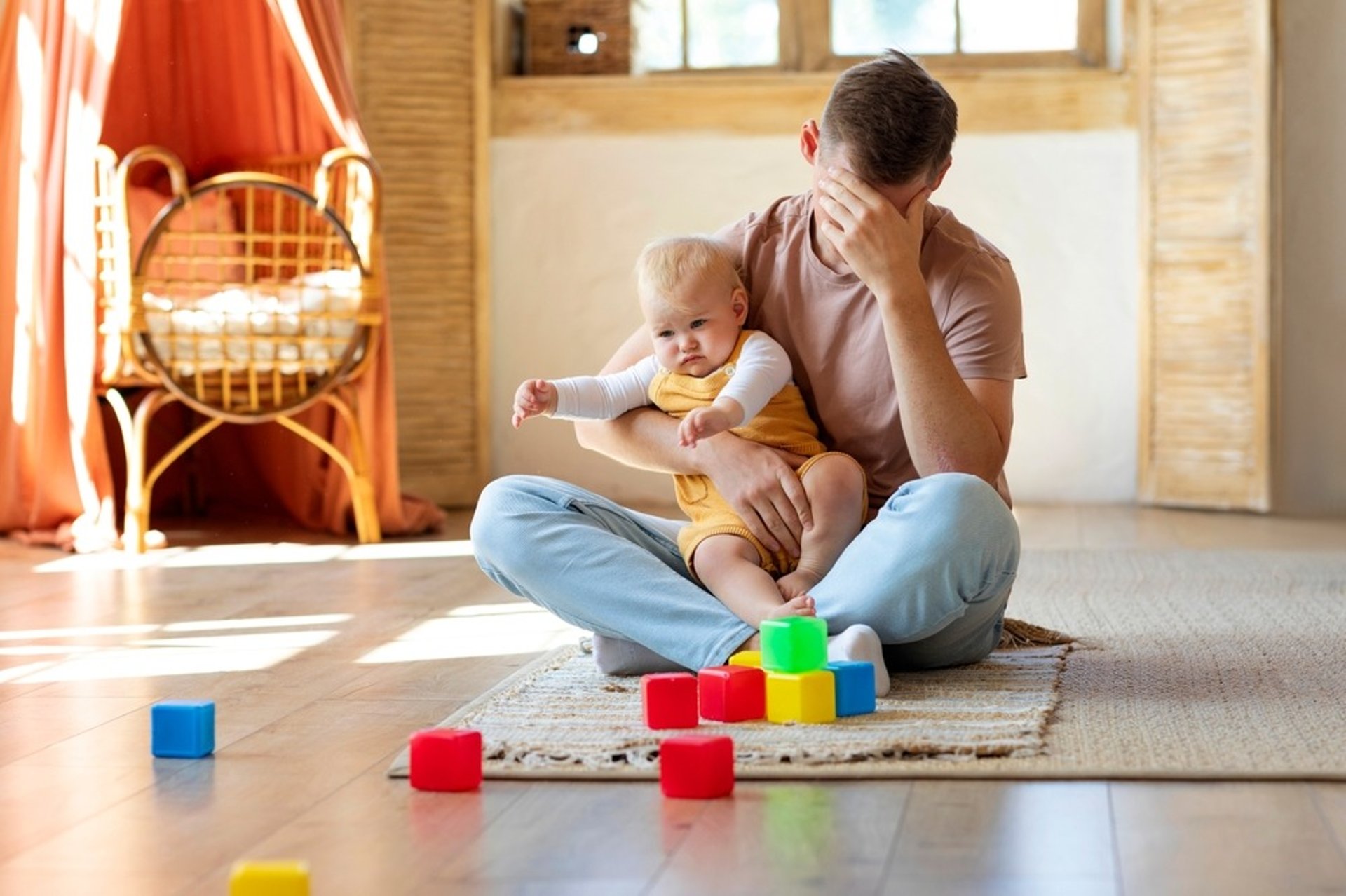
Parental Postpartum Depression: Causes, Symptoms, and Treatment Methods
Postpartum depression in fathers may affect mental health and family relationships. Learn about the causes, symptoms, and best treatment methods to ensure psychological balance for you and your family.
MENTAL HEALTH
Nifas
2/16/20254 min read


The period after childbirth marks a significant transition in the lives of parents, where roles and responsibilities change dramatically. While most discussions focus on postpartum depression in mothers, fathers also face psychological challenges that can lead to depression. This mental condition can significantly impact their quality of life and family relationships.
This article reviews the causes of postpartum depression in fathers and the factors contributing to its emergence. Additionally, it discusses the symptoms associated with this condition and the available treatment methods to help fathers navigate this challenging period successfully.
Why Does Postpartum Depression in Fathers Occur and What Are Its Effects?
Fathers can experience depression after the birth of their child, a common psychological condition during the first year of parenthood. Postpartum depression in fathers is an increasing phenomenon, as many new fathers experience feelings of depression and anxiety due to significant life changes. Although mothers undergo pregnancy and childbirth and often receive the focus regarding psychological changes after birth, fathers also face psychological challenges resulting from new parenting responsibilities, which greatly influence family life.
Many new fathers find themselves facing conflicting emotions ranging from joy to responsibility, which can lead to emotional exhaustion. This condition varies from person to person but often arises from difficulties adapting to the new role of a father, including financial responsibilities and lifestyle changes.
Causes of Postpartum Depression in New Fathers
Several psychological, social, and biological factors contribute to an increased likelihood of fathers experiencing postpartum depression, including:
● Personal and family history of depression: A personal history of depression increases the risk of fathers developing postpartum depression. A family history of depression also heightens the likelihood, as individuals with relatives suffering from depression are more prone to experience it.
● Hormonal changes: Fathers experience hormonal changes after childbirth, such as decreased testosterone levels (known as the male hormone) and increased estrogen levels. These changes can impact a father's mental state and increase the risk of depression. Elevated cortisol levels, known as the stress hormone, can also affect overall mental health.
● Sleep deprivation: Common among new fathers due to continuous childcare, sleep deprivation leads to brain chemistry changes that increase the risk of depression. Lack of sufficient sleep directly affects mental and physical resilience.
● Feelings of isolation: New fathers find it difficult to maintain social ties as before childbirth, leading to a sense of social isolation. Often, fathers rely heavily on their partners for support, but when the partner is busy caring for the child, the father can feel neglected and lonely.
● Life pressures: Life stressors such as job loss, poverty, marital conflicts, having a child with health issues, or an unplanned pregnancy can increase the risk of postpartum depression in fathers. These factors add to stress and psychological pressure, complicating the handling of new parenting challenges.
Symptoms of Postpartum Depression in Fathers That Should Not Be Ignored
Symptoms of postpartum depression in fathers manifest in various ways, significantly affecting their new life and ability to adapt to the new role. The most common symptoms among fathers include:
● Appetite changes: Fathers may start overeating or lose their appetite entirely.
● Sleep disturbances: Including insomnia or excessive sleeping, along with feeling restless or anxious at night.
● Persistent fatigue and low motivation: Fathers dealing with depression feel constantly tired and lack the desire to engage in activities they previously enjoyed.
● Constant sadness: They may experience deep sadness without a clear reason, possibly accompanied by unexplained crying.
● Feelings of guilt or shame: New fathers with this depression may feel guilty or ashamed about struggling with their parenting responsibilities, worsening their mental state.
● Social withdrawal: Fathers tend to avoid social and family gatherings, deepening feelings of loneliness.
● Increased irritability and aggression: Fathers experiencing postpartum depression may be more prone to stress and anger, affecting their relationships with others.
● Difficulty concentrating and decision-making: Depression causes mental confusion, making daily decision-making challenging.
These symptoms impact the father's mental health. Therefore, providing psychological and social support during this critical period is essential to alleviate the effects on their lives and their families.
How Is Postpartum Depression in Fathers Diagnosed?
While there is no globally standardized method for diagnosing postpartum depression in fathers, it often involves an interview with a doctor based on specific medical criteria. Depression symptoms in fathers are similar to those experienced by mothers but may also include decision-making difficulty, irritability, or an inability to express emotions or engage emotionally, persisting up to a year after childbirth.
To assist medical professionals in diagnosis, specific assessment tests are used, including:
● Edinburgh Postnatal Depression Scale (EPDS): A test used to detect signs of depression and anxiety after childbirth. Men may not express their feelings clearly or might understate their symptoms, so different assessment criteria are applied. However, this scale may not be entirely accurate for men, as some questions may not sufficiently reflect the symptoms they experience, leading to challenges in accurately diagnosing depression and anxiety.
● Patient Health Questionnaire (PHQ-9): Used as an additional alternative, it has proven effective in detecting postpartum depression in fathers.
● Partner assessment (EPDS-P): If the father cannot complete the assessment himself, his partner can provide observations concerning his mental state.
Doctors may also inquire with family or friends about any changes in the father's behavior, such as excessive irritability, unexplained physical complaints, or any past depressive episodes, aiding in accurate diagnosis. Additionally, the physician might compare the father's mental state before, during, and after pregnancy to determine any clear changes.
Best Treatment Methods for Postpartum Depression in Fathers
Treatment approaches can include a range of options that work individually or collectively to achieve the best outcomes. Treatment begins with maintaining a healthy lifestyle. Additionally, social support and psychotherapy play vital roles in improving mental health. In some cases, medication may be necessary. Treatment methods for postpartum depression in fathers include:
● Maintaining a healthy lifestyle: Adequate sleep, regular exercise, and a balanced diet contribute to improved mental health and a reduction in depressive symptoms.
● Social support: Building a strong support network of friends and family helps reduce feelings of isolation and enhances the father's ability to face psychological challenges.
● Psychotherapy: Speaking with a psychotherapist or social worker is an effective way to deal with negative thoughts and feelings, allowing the learning of effective strategies to overcome depression and improve mental health.
● Medication: In some cases, medication is necessary to alleviate symptoms. It is often preferred to combine medication with non-pharmacological solutions like psychotherapy or lifestyle adjustments to achieve a better treatment balance.
Nifas Advice
If you are a new father feeling mentally overwhelmed after childbirth, remember that taking care of yourself is just as important as taking care of your child. Ensure you get enough sleep, talk to your partner about your feelings, and don't hesitate to seek support from family or friends. If negative feelings persist, consulting a mental health professional may be a necessary step to improve your mental health and ensure a stable, happy family environment.
Frequently Asked Questions (FAQ's)
Contact Us


Tahlia Street, Abdul Latif Building, Opposite Karam Beirut Restaurant, First Floor, Office 101 Riyadh, Kingdom of Saudi Arabia
info@nifas.net
Our Address
Follow Us
